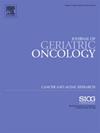Preferences for quality of life versus length of life in older women deciding about treatment for early breast cancer: A cross-sectional sub-analysis of the Bridging the Age Gap study
IF 3
3区 医学
Q3 GERIATRICS & GERONTOLOGY
引用次数: 0
Abstract
Introduction
Prioritising quality of life (QoL) or length of life is often necessary in the decision-making process for cancer care. This may be complicated in patients with limited life expectancy due to age and comorbidities. Older women with early breast cancer often receive non-standard care (primary endocrine therapy [PET] or omission of chemotherapy or radiotherapy) to reduce treatment morbidity and maintain QoL. We aimed to determine the perceived relative influence of QoL versus length of life in treatment decision making by older women with early (potentially curable) breast cancer.
Materials and Methods
This was a sub-study of the Age Gap multi-centre, cohort study, which prospectively recruited women >70 yrs. with early breast cancer. Baseline demographics, health characteristics, and QoL scores were analysed alongside a bespoke questionnaire to assess QoL and length of life preferences, including a modified version of the validated quality/quantity questionnaire, in a subset of the main study.
Results
The questionnaire was sent to 308 patients and 194 (63 %) were returned by participants with a median age of 75 years (range 70–93). Of these, 14 had PET and 180 had standard treatment (ST) (surgery +/− adjuvant therapy) including 37 who had chemotherapy. The PET group was older (median age 83.5 versus 76 years) and in poorer health (9/14; 64.3 % patients had one or more comorbidities versus 69/144; 47.9 %) with inferior baseline physical domain QoL scores. Patients who received PET valued QoL and length of life equally (Q score 0.87, L score 0.91), and patients who received chemotherapy favoured length of life over QoL (Q score 0.67, L score 0.86). Subgroup analysis showed a small correlation between increasing age and QoL preferences (Spearman's r = 0.2, P < 0.009). There was no correlation between co-morbidities, frailty, or global QoL and length of life/QoL preferences.
Discussion
Older women with early breast cancer valued length of life and QoL highly, with an association between preference for QoL and less aggressive treatment choices. Relative QoL preference increased with advancing age. More research is needed to define QoL determinants and outcomes following treatment to help patients make decisions that reflect their priorities.
Trial Registration Number
ISRCTN: 46099296.
老年妇女在决定早期乳腺癌治疗时对生活质量和生命长度的偏好:缩小年龄差距研究的横断面子分析
在癌症治疗的决策过程中,优先考虑生活质量(QoL)或生命长度通常是必要的。对于由于年龄和合并症而预期寿命有限的患者,这可能会很复杂。老年早期乳腺癌妇女往往接受非标准护理(初级内分泌治疗[PET]或省略化疗或放疗),以降低治疗发病率,维持生活质量。我们的目的是确定生活质量与生命长度对早期(潜在可治愈)乳腺癌老年妇女治疗决策的相对影响。材料与方法本研究是年龄差距多中心队列研究的一个子研究,该研究前瞻性地招募了70岁以上的女性。早期乳腺癌。基线人口统计学、健康特征和生活质量评分与定制问卷一起进行分析,以评估生活质量和生命长度偏好,包括在主要研究的一个子集中修改过的经过验证的质量/数量问卷。结果共向308例患者发放问卷,其中194例(63%)由参与者返回,参与者年龄中位数为75岁(70-93岁)。其中14人接受PET治疗,180人接受标准治疗(ST)(手术+/−辅助治疗),其中37人接受化疗。PET组年龄较大(中位年龄83.5 vs 76岁),健康状况较差(9/14;64.3%的患者有一种或多种合并症,而69/144;47.9%),基线物理领域生活质量评分较低。接受PET治疗的患者同样重视生活质量和生命长度(Q分0.87,L分0.91),接受化疗的患者更重视生命长度而不是生活质量(Q分0.67,L分0.86)。亚组分析显示,年龄增长与生活质量偏好之间的相关性较小(Spearman’s r = 0.2, P <;0.009)。合并症、虚弱或总体生活质量与生命长度/生活质量偏好之间没有相关性。患有早期乳腺癌的老年妇女高度重视生命长度和生活质量,对生活质量的偏好与较少积极的治疗选择之间存在关联。相对生活质量偏好随年龄增长而增加。需要更多的研究来确定生活质量的决定因素和治疗后的结果,以帮助患者做出反映其优先事项的决定。试验注册号:46099296。
本文章由计算机程序翻译,如有差异,请以英文原文为准。
求助全文
约1分钟内获得全文
求助全文
来源期刊

Journal of geriatric oncology
ONCOLOGY-GERIATRICS & GERONTOLOGY
CiteScore
5.30
自引率
10.00%
发文量
379
审稿时长
80 days
期刊介绍:
The Journal of Geriatric Oncology is an international, multidisciplinary journal which is focused on advancing research in the treatment and survivorship issues of older adults with cancer, as well as literature relevant to education and policy development in geriatric oncology.
The journal welcomes the submission of manuscripts in the following categories:
• Original research articles
• Review articles
• Clinical trials
• Education and training articles
• Short communications
• Perspectives
• Meeting reports
• Letters to the Editor.
 求助内容:
求助内容: 应助结果提醒方式:
应助结果提醒方式:


